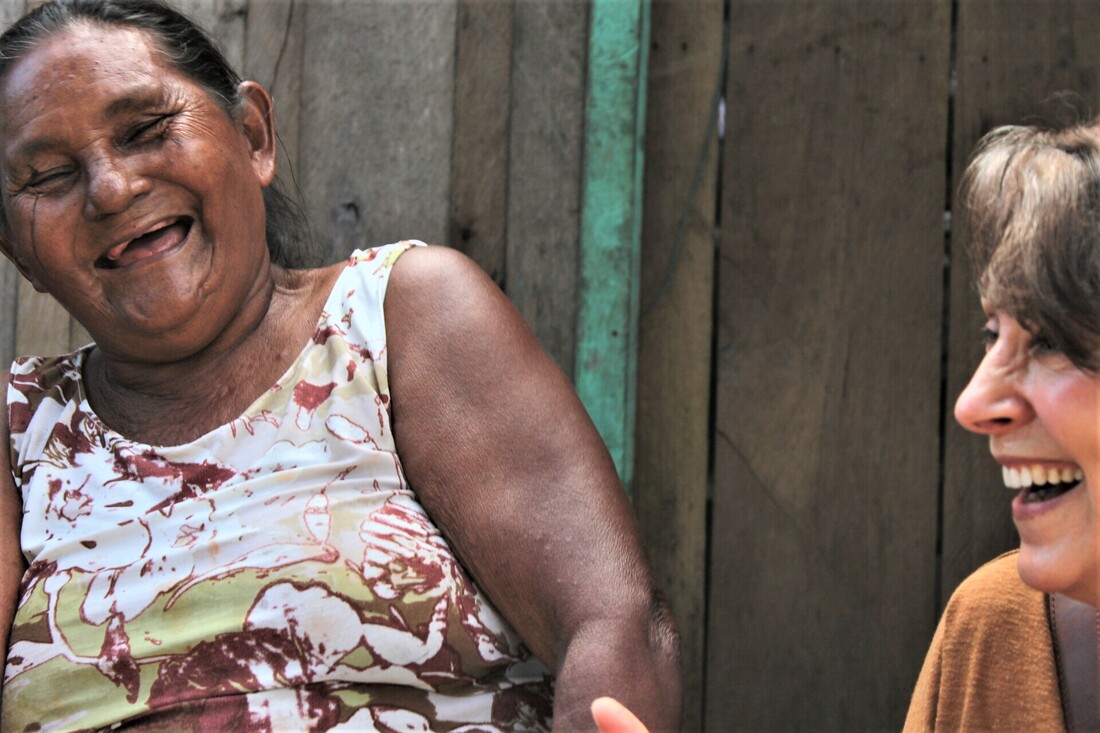
“Nineteen?” I gaped, trying to imagine birthing that many children in one lifetime. The elderly matriarch in front of me gave a gap-toothed grin. As founding chief, she had a right to be proud. “And thirty-two grandchildren,” she added. “You?” Woefully deficient as to fertility, I confessed, admiring the one big extended family which comprised her entire village.
Jerassina and I continued our conversation – rife with gestures, broken Portuguese, and many a belly laugh - while around us the villagers prepared a feast to welcome our small team to this remote Amazon settlement: slabs of a two-meter-long pirarucu fish, baked in banana leaves; exotic fruits and vegetables from their garden; chunks of savory meat from the paca - described as a large rodent (but, really, way cuter). The real feast, however, was to be found in the people themselves.
We (ICOMB delegates from Germany, India, Lithuania, and Canada) had flown from Curtiba to Manaus, driven long hours along a sketchy, desolate road (“Why maintain them?” our guide asked. “The rivers are our highways…”), then even longer hours by boat to arrive at this village. By then we were very much feeling our smallness: insignificant specs of humanity on the vast and untamed canvas of creation. It’s so…big. Over forty kilometers wide during the wet season, we were told, with villages that are days apart by boat. Winding through Amazon River tributaries where the dense vegetation and trees were half-submerged, we gawked at monkeys, giant lily pads, pink dolphins, massive ant colonies and unfamiliar birds, with only an occasional dugout canoe hinting at hidden civilization in an otherwise unbroken landscape. Were there really people living here? Why were we not seeing any other boats? Was the captain lost? Rounding a bend, a bend that looked like every other bend, the village suddenly appeared. In the middle of, well, nowhere.
The Ribeirinhos – Amazon River People – greeted us with shy smiles and reserve. “It’s okay,” we were assured by our translator, “they knew we were coming. We have built a friendship with them over the last couple of years, slowly finding ways to share the Gospel. So, we have the status of invited guests. If not,” he added, “they would have a legal right to kill us.” Hospitality has strict parameters in the Amazon, it seems.
The villagers tolerated our cameras, smiled at our awkwardness, laughed at our belly flops from their canoes when we went swimming, and pointed casually into the jungle when asked about bathroom facilities. It was with some dismay that I wandered along a path, jumping at each rustling noise in the underbrush. Words of half-joking warning from our guide echoed uncomfortably in my mind: Stay away from the hanging vines (“Snakes drop from them…”), look before you pee (“Disturbed ants can swarm; they destroyed a whole town once…”), don’t panic if there is an alligator (“They cannot look up and their muscles for opening their jaws are weak; best to jump onto the top of their heads and clamp down hard…”) and, above all, remember that “Everything here wants to kill you.” Clearly, a hasty ablution was called for.
We came as guests, and the honor of that was immense. The time to depart came all too soon; our captain did not want to be on the river after dark. The sun did set, however, before we arrived back at the town. Scott dug out his LED flashlight and a bold volunteer perched with it on the bow; less to see the route (the captain could find his way back blindfolded, we were assured…) than to keep from a head-on collision with logs, canoes, and – yup – alligators. Gazing up at stars that I swear I have never seen before, I marveled:
Where can I go from your Spirit? Where can I flee from your presence? If I go up to the heavens, you are there; if I make my bed in the depths, you are there. If I rise on the wings of the dawn, if I settle on the far side of the sea, even there your hand will guide me, your right hand will hold me fast (Psalm 139:7-10).
Jesus is in the Amazon.
 RSS Feed
RSS Feed
